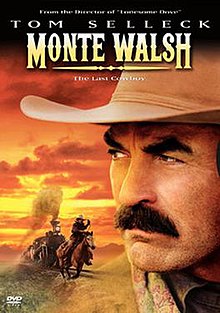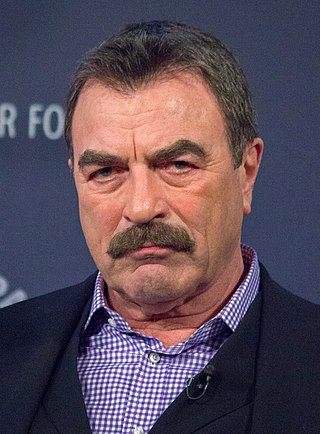
Thomas William Selleck is an American actor. His breakout role was playing private investigator Thomas Magnum in the television series Magnum, P.I. (1980–1988), for which he received five Emmy Award nominations for Outstanding Lead Actor in a Drama Series, winning in 1985. Since 2010, Selleck has co-starred as New York City Police Commissioner Frank Reagan in the series Blue Bloods. Beginning in 2005, he has portrayed troubled small-town police chief Jesse Stone in nine television films based on the Robert B. Parker novels.
Jack Warner Schaefer was an American writer known for his Westerns. His best-known works are the 1949 novel Shane, voted the greatest western novel, and the 1964 children's book Stubby Pringle's Christmas.

The Cowboys is a 1972 American Western film starring John Wayne, Roscoe Lee Browne, and Bruce Dern, and featuring Colleen Dewhurst and Slim Pickens. It was the feature film debut of Robert Carradine. Based on the 1971 novel of the same name by William Dale Jennings, the screenplay was written by Irving Ravetch, Harriet Frank, Jr., and Jennings, and the film was directed by Mark Rydell.

Longview is a village in southern Alberta, Canada. It is located in the Canadian Rockies foothills, on Cowboy Trail, 32 km west of High River and 64 km south of Calgary. Highwood River flows west of the village.

Earl Wesley Bascom was an American painter, printmaker, sculptor, cowboy, rodeo performer, inventor, and Hollywood actor. Raised in Canada, he portrayed in works of fine art his own experiences of cowboying and rodeoing across the American and Canadian West. Bascom was awarded the Pioneer Award by the ProRodeo Hall of Fame in 2016 and inducted into several halls of fame including the Canadian Pro Rodeo Hall of Fame in 1984. Bascom was called the "Cowboy of Cowboy Artists," the "Dean of Rodeo Cowboy Sculpture" and the "Father of Modern Rodeo." He was a participant member of the Church of Jesus Christ of Latter-day Saints.

The Virginian is a 1946 American Western film directed by Stuart Gilmore and starring Joel McCrea, Brian Donlevy, Sonny Tufts, and Barbara Britton. Based on the 1902 Owen Wister novel of the same name, the film was adapted from the popular 1904 theatrical play Wister had collaborated on with playwright Kirke La Shelle. The Virginian is about an eastern school teacher who comes to Medicine Bow in Wyoming and encounters life on the frontier. The film is a remake of the 1929 movie with Gary Cooper and Walter Huston. There have been several versions of the story, beginning with a 1914 film directed by Cecil B. DeMille and including a 1960s television series that bore little relation to the book other than the title. The film was originally distributed by Paramount Pictures, and is currently owned by EMKA.

Last Stand at Saber River is a 1997 American Western television film directed by Dick Lowry and starring Tom Selleck, Suzy Amis, Haley Joel Osment, Keith Carradine, David Carradine, Tracey Needham, David Dukes and Harry Carey Jr. Based on the 1959 novel of the same title by Elmore Leonard, the film is about a Civil War Confederate veteran who tries to put the pieces of his life back together but finds himself fighting a new battle on the frontier. Seeking to reclaim his Arizona homestead from rebel pioneers who sympathize with the Union war effort, he joins forces with his Union adversary to make a last stand for the one thing worth fighting for, his family. In 1997, Osment won a YoungStar Award for Best Performance by a Young Actor in a Made For TV Movie. In 1998, the film received the Western Heritage Awards Bronze Wrangler for Television Feature Film.
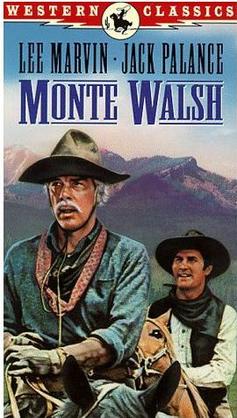
Monte Walsh is a 1970 American Western film directed by cinematographer William A. Fraker starring Lee Marvin, Jeanne Moreau and Jack Palance. The name "Monte Walsh" is taken from the title of a 1963 western novel by Jack Schaefer, but the film has little to do with the plot of Schaefer's book. The film was set in Harmony, Arizona. The story has elements of a tragedy. The song played over the opening credits is "The Good Times Are Comin' " by Mama Cass, with music and lyrics by John Barry and Hal David.
Samurai Cowboy is a film shot in conjunction with the Alberta Motion Picture Development Corporation, and Monarch Home video. The film was shot in 1993 at Waterton Lakes National Park, Alberta. The film was directed by Canadian director Michael Keusch. For the director Michael Keusch, a graduate of the film program at the Southern Alberta Institute of Technology, the film was a chance to revisit the province he grew up in.
Monte Walsh may refer to:
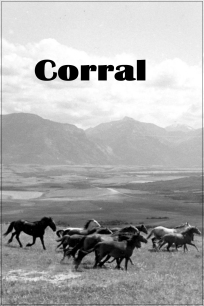
Corral is a 1954 National Film Board of Canada (NFB) short film documentary about the life of a cowboy, directed by Colin Low and produced by Tom Daly. It featured cinematography by Wolf Koenig and a musical score by Eldon Rathburn, and was produced as part of the NFB's postwar Canada Carries On series.

Public Cowboy No. 1 is a 1937 American Western film directed by Joseph Kane and starring Gene Autry, Smiley Burnette, and Ann Rutherford. Based on a story by Bernard McConville, the film is about a singing cowboy who chases down rustlers who are using airplanes, shortwave radios, and refrigerated trucks to steal cattle.
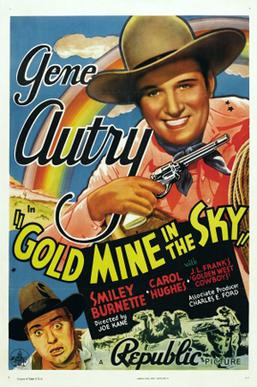
Gold Mine in the Sky is a 1938 Western film directed by Joseph Kane and starring Gene Autry, Smiley Burnette, and Carol Hughes. Based on a story by Betty Burbridge, the film is about a singing cowboy and ranch foreman who, as executor of the owner's will, must see that the daughter and heiress does not marry without his approval.

Cold Feet is a 1989 comedy film directed by Robert Dornhelm. It stars Keith Carradine, Tom Waits, Bill Pullman, Sally Kirkland & Rip Torn.

Yodelin' Kid from Pine Ridge is a 1937 American Western film directed by Joseph Kane and starring Gene Autry, Smiley Burnette, and Betty Bronson. Based on a story by Jack Natteford, the film is about the son of a Southeastern cattleman who becomes entangled in a war between the cattlemen and "turpentiners" who make their living harvesting pine tree sap.
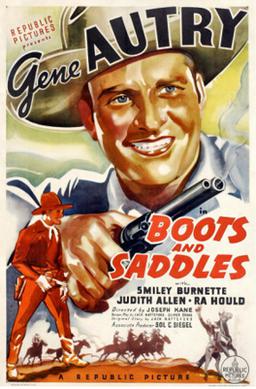
Boots and Saddles is a 1937 American Western film directed by Joseph Kane and starring Gene Autry, Smiley Burnette, and Judith Allen. Based on a story by Jack Natteford, the film is about a young Englishman who inherits a ranch that he wants to sell, but is turned into a real Westerner by a singing cowboy.
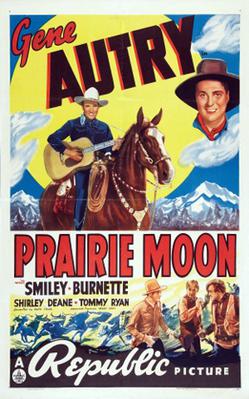
Prairie Moon is a 1938 American Western film directed by Ralph Staub and starring Gene Autry, Smiley Burnette, and Shirley Deane. Written by Betty Burbridge and Stanley Roberts, the film is about a singing cowboy who takes care of three tough boys sent west from Chicago after their father dies and leaves them a cattle ranch.
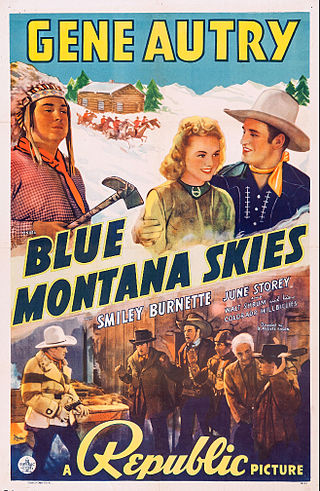
Blue Montana Skies is a 1939 American Western film directed by B. Reeves Eason and starring Gene Autry, Smiley Burnette, and June Storey. Based on a story by Norman S. Hall and Paul Franklin, the film is about a singing cowboy who goes up against a gang of fur smugglers operating near the Canada–United States border.

Rustling A Bride is a lost 1919 silent film comedy-Western directed by Irvin Willat and starring Lila Lee.
In Old Cheyenne is a 1931 Western film directed by Stuart Paton. It is a re-make of the 1930 film Phantom of the Desert.
